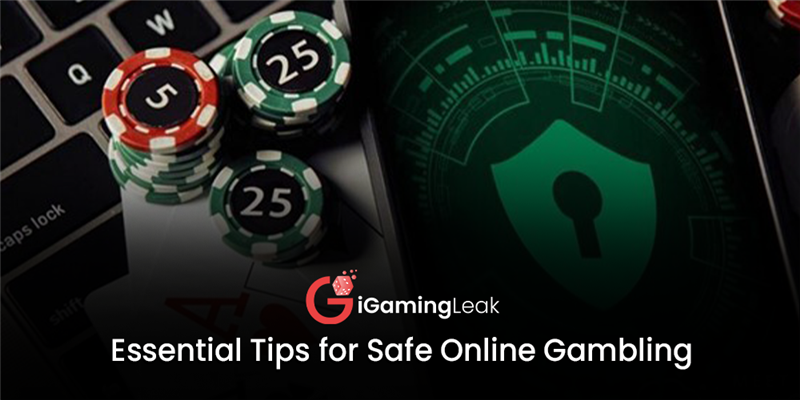Last Updated on June 3, 2025 by iGL Owner
Online gambling has grown into a widely popular form of digital entertainment, offering thrill and convenience with just a few clicks. However, with real money on the line, playing safely and responsibly is more important than ever. Whether you’re just getting started or you’re a regular player, understanding how to protect yourself while gambling online can make all the difference in your overall experience.
1. Choose Licensed and Regulated Platforms
Always gamble on websites that are licensed by recognized authorities. Licensing ensures that the platform adheres to strict regulations, offering fair games and secure transactions. Look for licenses from bodies like the Malta Gaming Authority (MGA) or the UK Gambling Commission. These platforms are regularly audited, ensuring transparency and fairness.
2. Prioritize Secure Payment Methods
Opt for gambling sites that offer secure payment options. Trusted platforms use encryption technologies like SSL to protect your financial information. Payment methods such as credit cards, e-wallets (e.g., PayPal, Skrill), and bank transfers are typically secure. Avoid sites that request unconventional payment methods or lack clear payment policies.
3. Read Reviews and Research the Platform
Before registering, research the platform thoroughly. Read reviews from other players to gauge their experiences. Look for feedback on payout reliability, customer service responsiveness, and overall user satisfaction. Forums and review sites can provide valuable insights into the platform’s reputation.
4. Understand the Risks Involved
Online gambling carries several risks, including:
- Unlicensed Platforms – Some sites operate without proper regulation, increasing the risk of unfair practices and withheld winnings.
- Data Breaches – Unsecured platforms may expose your personal and financial information to hackers.
- Addiction – The accessibility of online gambling can lead to unhealthy habits or financial distress if not managed properly.
- Fraudulent Activities – Scammers can disguise themselves as legitimate operators, putting your money at risk.
Being aware of these risks helps you take proactive steps to mitigate them.
5. Set Limits and Stick to Them
Establish clear limits for both time and money spent on gambling. Decide on a budget that you can afford to lose and set time constraints for your gambling sessions. Many platforms offer tools to help you set these limits. Utilizing these features can prevent excessive gambling and help maintain control.
6. Use Strong, Unique Passwords
Protect your accounts with strong, unique passwords. A robust password should be at least 12 characters long, combining letters, numbers, and symbols. Avoid using easily guessable information like birthdays or common words. Consider using a reputable password manager to generate and store complex passwords securely.
7. Enable Two-Factor Authentication (2FA)
Enhance your account security by enabling two-factor authentication. 2FA adds an extra layer of protection by requiring a second form of verification, such as a code sent to your phone. This makes it significantly harder for unauthorized users to access your account.
8. Avoid Gambling Under the Influence
Gambling while under the influence of alcohol or drugs can impair judgment and lead to risky decisions. Always gamble with a clear mind to make rational choices and avoid unnecessary losses.
9. Be Cautious of Promotions and Bonuses
While bonuses and promotions can be enticing, read the terms and conditions carefully. Some offers come with stringent wagering requirements or hidden clauses. Ensure you understand the rules associated with any bonus before accepting it.
10. Utilize Responsible Gambling Tools
Reputable platforms provide tools to promote responsible gambling, such as:
- Self-Exclusion Options: Temporarily or permanently block access to your account.
- Deposit Limits: Set maximum deposit amounts over a specific period.
- Reality Checks: Receive notifications about the duration of your gambling sessions.
Utilizing these tools can help maintain healthy gambling habits.
11. Keep Software and Devices Updated
Ensure that your devices and software are up to date. Regular updates patch security vulnerabilities and protect against malware or phishing attacks. Use reputable antivirus software and avoid downloading files or clicking on suspicious links related to gambling.
12. Seek Help When Needed
If you suspect that gambling is becoming a problem, seek help immediately. Many organizations offer support and resources for individuals struggling with gambling addiction. Don’t hesitate to reach out to professionals or support groups for assistance.
Final Thoughts
Online gambling can be fun, rewarding, and even profitable—but only if approached with care. By choosing licensed platforms, protecting your data, setting boundaries, and staying mindful of your behavior, you can enjoy the thrill of the game without putting yourself at risk. Prioritize your safety, stay informed, and remember: responsible gambling is always the best bet.
FAQs
1. How do I know if an online gambling site is legit?
Look for sites licensed by respected regulatory bodies like the UK Gambling Commission, Malta Gaming Authority, or PAGCOR. Check for SSL encryption (HTTPS in the URL), read player reviews, and ensure they offer responsible gambling tools. Legitimate platforms are transparent about their licenses, terms and conditions, and customer support policies.
2. What should I do if I think I’m developing a gambling problem?
The first step is to acknowledge the issue. Use responsible gambling tools such as deposit limits or self-exclusion features. Reach out to professional help organizations like Gamblers Anonymous, BeGambleAware, or Gambling Therapy. Many online casinos also provide links and contact info for support services directly on their sites.


